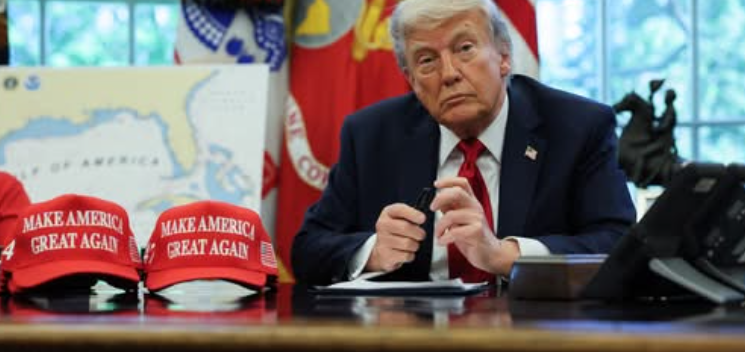The White House is continuing to stand by Secretary of Defense Pete Hegseth in the face of a growing controversy. According to multiple sources familiar with the incident, Hegseth allegedly used a second group chat on the Signal messaging app to share sensitive information about a planned U.S. military strike against Houthi rebels in Yemen. This information, which was allegedly passed along to individuals outside the typical security channels, has raised concerns about the security and confidentiality of sensitive military operations.
The revelation of this second group chat has led to questions regarding Hegseth’s handling of classified material and the communication channels used within the U.S. Department of Defense. Sources who spoke to ABC News reported that the contents of the chat included specific details about the timing and targets of the strike, which was planned for March. The White House has so far defended Hegseth, stating that the information was shared in a secure and responsible manner, and that no national security was compromised as a result of the leak. The situation, however, has raised concerns about the growing use of messaging apps like Signal for official government communications, which have proven to be difficult to regulate and monitor.
The ongoing legal battle surrounding Kilmar Abrego Garcia, a migrant who was wrongfully deported by the administration, has further complicated the White House’s standing on security and procedural integrity. Garcia, a resident of Maryland, was living in the U.S. under lawful status when he was mistakenly deported. According to his legal team, the deportation was based on erroneous information and a failure within the immigration system. Garcia’s case is now a focal point in the ongoing debate surrounding immigration policy, and it has prompted calls for increased transparency and accountability within U.S. immigration procedures.
Garcia’s wrongful deportation has led to a court case that has garnered national attention. His lawyers are pushing for his return to the U.S., stating that the deportation was a clear violation of his rights. They claim that Garcia was not given adequate legal representation during the process and that the deportation was executed without proper verification of his status. The administration has yet to issue a formal apology, but legal experts predict that the case could have significant ramifications for U.S. immigration policy in the future, particularly in terms of procedural checks and balances.
Adding to the complexities surrounding the White House’s position is the growing influence of Elon Musk, who has taken on a prominent role in U.S. government affairs as part of his new role overseeing the Department of Government Efficiency. Musk, known for his ventures in electric cars, space exploration, and social media, has recently made waves with his aggressive push for budget cuts and federal layoffs in an effort to streamline government operations. His actions have sparked backlash from various sectors of government and public service, with many critics accusing him of undermining essential services and public institutions.
Musk has stated that he plans to begin retreating from government work, signaling that his tenure at the helm of the Department of Government Efficiency may be winding down. While the details of Musk’s departure remain unclear, his comments have fueled speculation about the future of the department and his vision for the federal government. Musk’s approach to government efficiency has been polarizing, with some praising his commitment to reducing waste and modernizing government systems, while others argue that his efforts have resulted in significant disruptions to vital services.
Despite Musk’s increasingly public retreat, his influence on the White House remains undeniable. His budget cuts have already led to significant restructuring within various federal agencies, particularly in areas such as environmental protection, health services, and public education. While some of these cuts have been presented as necessary for fiscal responsibility, critics argue that they have disproportionately affected marginalized communities and essential services.
The combination of these ongoing issues — from Hegseth’s alleged misuse of secure communication channels to Garcia’s wrongful deportation and Musk’s controversial government cuts — has created a tense atmosphere within the White House. While officials continue to defend their actions, public confidence in the administration’s ability to handle sensitive information and uphold the integrity of government processes is beginning to wane.
The White House has maintained that Hegseth’s use of the Signal app for government communications was not a breach of security protocols. Officials argue that the app was used with the proper encryption and that the information shared did not compromise any classified operations. However, the growing use of messaging apps by government officials has sparked concerns about the security of these platforms, particularly in the context of sensitive military operations. Critics argue that relying on unregulated communication tools undermines the transparency and accountability of government operations, making it more difficult to trace leaks and hold officials accountable.
The situation surrounding Garcia’s deportation continues to unfold, with his legal team pushing for his return to the U.S. and public support growing for his cause. Garcia’s case has become emblematic of the challenges facing the U.S. immigration system, with many advocates calling for reforms to prevent future mistakes and ensure that migrants’ rights are protected.
Meanwhile, Musk’s influence continues to loom over the White House. His aggressive budget cuts and focus on government efficiency have sparked significant debate about the future of federal services. While some applaud his efforts to reduce waste and streamline operations, others worry that his actions could lead to the dismantling of essential services and harm to the most vulnerable Americans.
As these issues continue to unfold, it is clear that the White House is facing significant challenges in maintaining public trust and accountability. From the mishandling of secure communications to the ongoing legal battles surrounding wrongful deportations and the controversy surrounding budget cuts, the administration’s ability to navigate these issues will be critical to its future success. How the White House responds to these challenges — and whether it can restore faith in its ability to manage sensitive matters — will have a lasting impact on the political landscape.
In conclusion, the White House is facing multiple high-stakes challenges, from defending the actions of Secretary of Defense Pete Hegseth to addressing the growing concerns over the wrongful deportation of Kilmar Abrego Garcia and navigating the political fallout from Elon Musk’s government reforms. Each of these issues has the potential to shape public opinion and influence the administration’s ability to govern effectively. As the investigations and legal battles continue, the administration will need to carefully manage these challenges to maintain its credibility and political standing.



